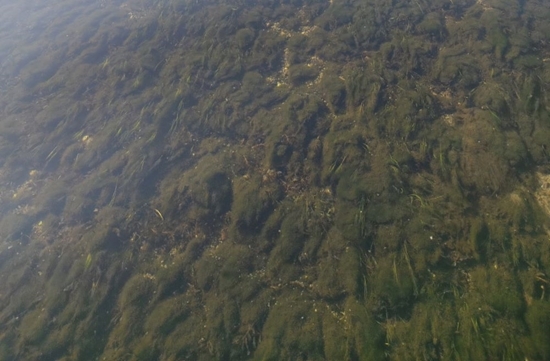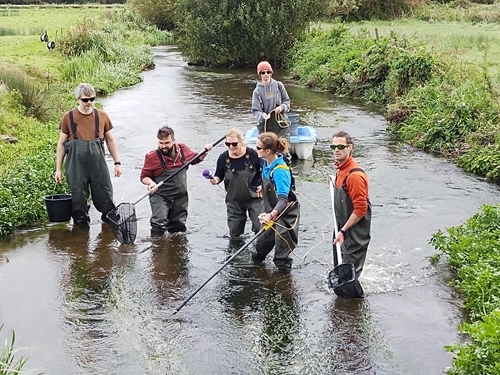
By Dylan Roberts, GWCT Head of Fisheries
Most of you may think: "What is the problem with salmon?" The fishmongers' counters are full of whole, filleted, smoked and numerous forms of processed salmon. The reality is that this is all farmed salmon, reared in cages, at sea to satisfy a market which demands cheap food. Next time you are at the supermarket, ask the fishmonger for a piece of “wild Atlantic salmon” and he will look at you oddly.
The reality is that the numbers of wild Atlantic salmon have declined dramatically over the last 40 years, to such an extent that in England and Wales populations are now classified as “at risk” on most rivers. There are so few wild salmon swimming our rivers now, that historical commercial fisheries and anglers are not allowed to kill any salmon in the whole of Wales, or on most rivers in England.
If you go back to the early and mid-19th century, salmon were so abundant that they were harvested in their 100’s of thousands, excess was fed to pigs and used as fertilizer on the land. Staff at country estates insisted that it was written into their contracts that they should only be fed wild salmon four times a week. But what has happened?
Some of the problems at sea begin in the river
Our research tells us that much of the problem lies at sea, with declining marine survival and growth rates. However, we believe that some of the issues for salmon at sea begin in the river and two significant problems are declining water quality and physical habitat - together these are producing juvenile salmon which are less fit to survive in the ocean.
Having monitored and researched the population of wild Atlantic salmon in the river Frome in Dorset for many years, we have seen first-hand the changes to the physical nature of the river. In recent years, we have seen a huge growth of algae between spring and autumn which smothers the riverbed, shades and then reduces the growth of plants like water crowfoot, which are crucial habitats for juvenile salmon and the insects upon which they feed.
Excessive algae, also reduces the amount of oxygen available to fish in rivers at night and especially during the warmer months, this can stress, reduce the growth of and even kill fish. The algae grows excessively due to high levels of nutrients - nitrate and phosphate which are released into rivers from sewage and septic tank discharges and running off agricultural land.
Our published research shows that where these plants are abundant, we find more juvenile salmon and also larger juvenile salmon. Being larger is crucial to increase their chance of survival at sea, where our research also tells us that the larger juvenile salmon when entering the sea are three times more likely to return as adults. So juvenile salmon in the Frome need the river full of clean water and healthy plants!
Fodder crops and biofuel
We are especially concerned about the massive expansion of growing maize in the Frome catchment for cattle fodder and biofuel over the last 10 years in particular. After harvesting maize in late September and October, fields are often left brown over the winter which exposes the soil to run off into rivers during heavy rain, carrying with it the nitrate and phosphate added through fertilizer and slurry to ensure the crop grows well.
This effect is also true for cattle fodder crops which are used in winter to feed animals left outdoors. The actual sediment or mud that runs off the fields then smothers the salmon’s and other species' spawning gravel and reduces the survival of their eggs and also diversity and abundance of invertebrates upon which they feed.
Rivers are the spawning and nursery areas for our wild Atlantic salmon, they need clean gravel to spawn and diverse physical habitats, and in the case of a lowland rivers like the Frome this means abundant aquatic plants. Unfortunately, the combination of intensive agriculture and sewage is suffocating our rivers and we are loosing our wild salmon.

Excessive algae smothering the riverbed and water crowfoot in the river Frome in September 2023, these sights are sadly commonplace through the catchment.
BBC coverage of the annual parr tagging
During September each year, the GWCT fisheries team spend four weeks catching, tagging, weighing and measuring 10,000 juvenile salmon and 3,000 juvenile trout in a bid to understand the challenges they face both in rivers and at sea and how many survive to return back to the river Frome to spawn.
This year, BBC reporter George Sharpe, joined them as they fished a stretch of river outside Dorchester. Declining salmon stocks became their top news story across BBC Radio Solent on 28 September.
It was followed by a BBC News website article here and a BBC Sounds report (listen here).

BBC reporter George Sharpe (second from left) taking part in the parr tagging along the river Frome outside Dorchester.